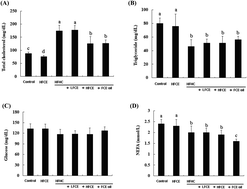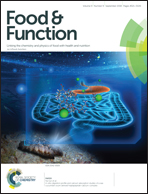Freshwater clam extract reduces liver injury by lowering cholesterol accumulation, improving dysregulated cholesterol synthesis and alleviating inflammation in high-fat, high-cholesterol and cholic acid diet-induced steatohepatitis in mice†
Abstract
Freshwater clam (Corbicula fluminea) is a traditional liver-protective food in Asia. Recent studies have renewed attention on high cholesterol accumulation and dysregulated cholesterol synthesis in the liver as a critical factor in the progression of nonalcoholic fatty liver disease (NAFLD) to nonalcoholic steatohepatitis (NASH). In this study, we investigated the protective effects of freshwater clam extract (FCE) and its fat fraction (FCE oil) on high-fat, high-cholesterol and cholic acid (HFHC) diet-induced lean steatohepatitis in mice. Mice were fed a HFHC diet containing FCE or FCE oil for 6 weeks. FCE, but not FCE oil, feeding reduced liver injury as indicated by decreased plasma alanine aminotransferase activity. Liver total cholesterol accumulation was reduced after FCE and FCE oil treatment. Accumulation of squalene and desmosterol, the precursors of cholesterol, in the liver was reduced by FCE but not by FCE oil. The caspase-1 (p10) and interleukin (IL)-1β (p17) protein expressions in the liver were suppressed by both FCE and FCE oil. Therefore, FCE may act as functional food that can reduce steatohepatitis and liver injury by reducing cholesterol accumulation, improving dysregulated cholesterol synthesis and attenuating inflammation.



 Please wait while we load your content...
Please wait while we load your content...